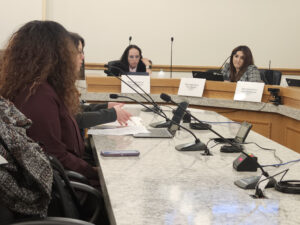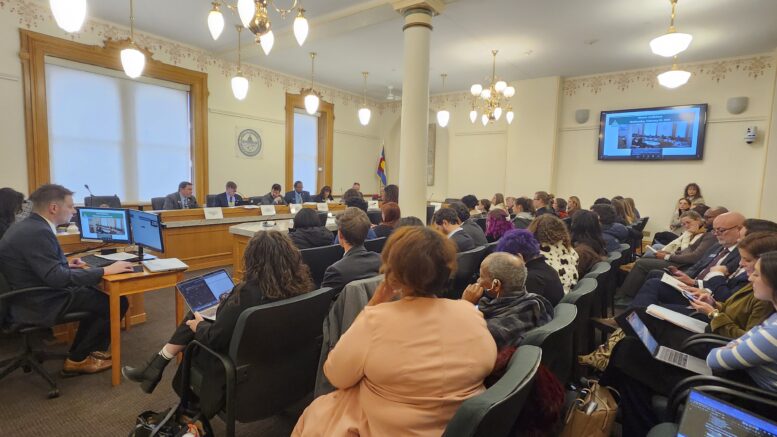Colorado Democrats once again are seeking to ban “junk fees” that get added without option onto the advertised prices of goods and services, but their focus this year has shifted largely from hotels and ticket sellers to landlords.
Following a four-hour hearing Wednesday, the House Judiciary Committee advanced House Bill 1090, which seeks to define the kinds of fees that are deceptive pricing practices and offer protection to consumers through a new private right of action. HB 1090, sponsored by Democratic Reps. Emily Sirota of Denver and Naquetta Ricks of Aurora, passed on a party-line vote and may be debated by the full House as soon as next week.
Ricks first brought the bill last year, saying she wanted to stop add-on bill charges like hotel resort fees and ticket processing fees that boost costs for an average Colorado family of four by $3,300 annually (according to Consumer Reports) over advertised prices. She ended up killing the bill late in the session when she was unable to work out crucial details with tech industry leaders and other affected parties.
In December, however, the Federal Trade Commission enacted its own rule specifically focused on live-event ticketing, hotels and vacation rentals. And while HB 1090 would offer some more protection in those areas, it is laden with pages of new prohibitions on landlord fees that clearly energized most of its backers in its first committee hearing.
How the bill affects rent agreements
Those provisions would prevent landlords from charging fees above monthly rent prices for services such as garbage pickup, maintenance of common areas and utilities beyond the water and power specifically used in each apartment. It also would bar fees for processing of rent payments, for property taxes and for services not provided, and it bans landlords from increasing any fees more than 2% over the course of a yearlong rental agreement.

Colorado state Rep. Emily Sirota, sitting beside co-sponsoring Rep. Naquetta Ricks, testifies Wednesday about their bill to ban “junk fees.”
Tenants from several apartment properties told committee members they have been forced to pay fees of $150 to $180 a month in addition to their rents for everything from property maintenance to pest control to processing of their checks. At a time when roughly one-third of Colorado households pay at least 30% of their incomes to housing, such hidden fees exacerbate the state’s growing unaffordability crisis and those fees need to be included in the overall rent price, backers said.
“What this bill says is you can charge the fee, but you just need to disclose it and be transparent,” said Ricks, pointing to people who said they learned of the extra costs only after agreeing to rental contracts or product purchases. “Coloradans should not be paying more than $3,000 per year in hidden fees because of deceptive trade practices.”
Revisions to limits on junk fees
While most business and industry groups continue either to oppose the bill or seek amendments, sponsors made several changes Wednesday that addressed concerns.
They specified that restaurant and brewery service fees — increasingly common charges meant to supplant or supplement tips and boost salaries for back-of-the-house workers — are not illegal if the businesses display and explain the existence of the fee clearly. They also offered safe-harbor provisions to industries covered by federal rules around their fees, from airlines to broadband providers to hotels, if follow those guidelines.
And the sponsors removed a provision of the bill that would entitle complainants to treble damages — three times the damages that actually incurred. Instead, landlords who are accused through written communication of violating the law and who do not pay out damages within 14 days now may be subject to actual damages plus 18% per year, compounded annually.
Businesses cite continuing problems
However, HB 1090 still allows for citizens to file lawsuits in which they can recover actual damages, costs and reasonable attorney fees, and business leaders said they want this potentially costly enforcement mechanism removed. Colorado Bankers Association executive Alison Morgan said enforcement of the law should reside with the Colorado Attorney General’s office, and TechNet lobbyist Melanie Layton said this is tough especially when the bill needs further clarification on exactly which fees it would ban.
“That certainly puts businesses in Colorado, even good actors, subject to additional litigation and legal action,” added Meghan Dollar, senior vice president of governmental affairs for the Colorado Chamber of Commerce.
Questions also remain about how the proposed law would affect some professionals. Attorneys and certified public accountants noted during testimony, for example, that their fees are dependent on the specific services potential clients seek, and they don’t want that form of pricing to be considered junk fees.
Junk fees part of affordability debate
HB 1090 does clarify that ancillary fees that are not mandatory — such as extra monthly costs that landlords charge for parking or for occupants with pets — are not junk fees that must be included in the advertised price of a lease.
The bill is part of House Democrats’ efforts to address affordability by limiting how or what some businesses can charge for their goods and services — bills that so far are running into universal opposition from Republicans accusing the majority party of price-setting. Two other bills with similar aims have made it to the House floor — a measure that would define price hikes of 10% or more as price-gouging and another that would limit how landlords can use algorithms involving competitor pricing information to set lease costs.
Republicans, meanwhile, are looking to roll back fees on everything from paper bags to Amazon deliveries and to remove some regulations. Several of those bills have died after their first committee hearings.
